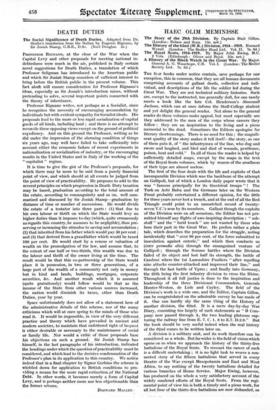DEATH DUTIES
PROFESSOR Mornfaro, at the close of the War when the Capital Levy and other proposals for meeting national in- debtedness were much in the air, published in Italy certain novel suggestions for Death Duties, a translation of which Professor Seligman has introduced to the American public and which Sir Josiah Stamp considers of sufficient interest to bring before the British public in the present volume. This fact alorfe will ensure consideration for Professor Rignano's ideas, especially as Sir Josiah's introduction raises, without pretending to solve, several important points connected with the theory of inheritance.
Professor Rignano writes, not perhaps as a Socialist, since he recognizes the necessity of encouraging accumulation by individuals but with evident sympathy for Socialist ideals. His proposals lead to the more or less rapid socialization of capital goods of all kinds, including land ; and there is no attempt to reconcile these opposing views except on the ground of political expediency. And on this ground the Professor, writing as he did under the impression of the alarming condition of things six years ago, may well have failed to take sufficiently into account either the economic failure of recent experiments in nationalization or socialization of industry, or the encouraging results in the United States and in Italy of the working of the " capitalist " regime.
It is time to give the gist of the Professor's proposals, for which there may be more to be said from a purely financial point of view, and which should at all events be judged from the point of view of practicability. He proposes to add to the several principles on which progression in Death Duty taxation may be based, graduation according to the total amount of the estate, according to consanguinity and so on, well sum-: marized and discussed by Sir Josiah Stamp—graduation by distance of time or number of successions. He would divide the estate of a testator into three parts : (1) that due to his own labour or thrift on which the State would levy no higher duties than it imposes to-day (which, quite erroneously as regards this country, he assumes to be negligible), thus pre- serving or increasing the stimulus to saving and accumulation ; (2) that inherited from his father which would pay 50 per cent ; and (3) that derived from a grandfather which would be taxed 100 per cent. He would start by a census or valuation of wealth on the promulgation of the law, and assume that, to the extent of one half or two-thirds, this wealth was due to the labour and thrift of the owner living at the time. The result would be that this co-partnership of the State would place it in possession, in two or three generations, of a large part of the wealth of a community not only in money but in kind and lands, buildings, mortgages, corporate securities, &c. And another result which it is assumed (quite gratuitously) would follow would be that as the income of the State from other various sources increased, the nation would diminish its taxes, other than Death Duties, year by year.
Space unfortunately does not allow of a statement here of the administrative details of this scheme, nor of the many criticisms which will at once spring to the minds of those who read it. It would be impossible, in view of the very different practice and theory which have prevailed in ancient and modern societies, to maintain that unfettered right of bequest is either desirable or necessary to the maintenance of social or family life. NOr would a critic of those propoSals base his objections on such a ground. Sir Josiah Stamp has himself, in the last paragraphs of his introduction, indicated the headings under which the question of practicability must be considered, and which lead to the decisive condemnation of the Professor's plan in its application to this country. We notice indeed that hi a final chapter by Signor Gerbino the scheme is whittled down for application to British conditions to pro- viding if means for the more rapid extinction :of the National Debt. In other words, it becomes merely a form of Capital Levy, and is perhaps.neither more nor less objectionable thAn the former scheme.
BDONARD MALLET-






























































 Previous page
Previous page